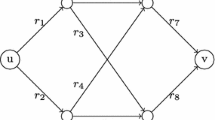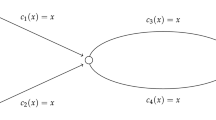Abstract
We consider congestion games with linear latency functions in which each player is aware only of a subset of all the other players. This is modeled by means of a social knowledge graph G in which nodes represent players and there is an edge from i to j if i knows j. Under the assumption that the payoff of each player is affected only by the strategies of the adjacent ones, we first give a complete characterization of the games possessing pure Nash equilibria. Namely, if the social graph G is undirected, the game is an exact potential game and thus isomorphic to a classical congestion game. As a consequence, it always converges and possesses Nash equilibria. On the other hand, if G is directed an equilibrium is not guaranteed to exist, but the game is always convergent and an equilibrium can be found in polynomial time if G is acyclic, even if finding the best equilibrium remains an intractable problem.
We then investigate the impact of the limited knowledge of the players on the performance of the game. More precisely, given a bound on the maximum degree of G, for the convergent cases we provide tight lower and upper bounds on the price of stability and asymptotically tight bounds on the price of anarchy. Such results are determined for four natural social cost functions: total and maximum presumed latencies, that is the ones the players believe to pay due to the fact that they are only aware of the existence of their neighbors, and total and maximum perceived latencies, i.e. actually experienced due to all (and not only the known) players using the same facilities.
All the results are then extended to singleton congestion games.
Similar content being viewed by others
References
Anshelevich, E., Dasgupta, A., Tardos, É., Wexler, T.: Near-optimal network design with selfish agents. Theory Comput. 4(1), 77–109 (2008)
Ashlagi, I., Krysta, P., Tennenholtz, M.: Social context games. In: WINE, pp. 675–683 (2008)
Awerbuch, B., Azar, Y., Epstein, A.: Large the price of routing unsplittable flow. In: Gabow, H.N., Fagin, R. (eds.) STOC, pp. 57–66. ACM, New York (2005)
Babaioff, M., Kleinberg, R., Papadimitriou, C.H.: Congestion games with malicious players. In: MacKie-Mason, J.K., Parkes, D.C., Resnick, P. (eds.) ACM Conference on Electronic Commerce, pp. 103–112. ACM, New York (2007)
Beier, R., Czumaj, A., Krysta, P., Vöcking, B.: Computing equilibria for congestion games with (im)perfect information. In: Munro, J.I. (ed.) SODA, pp. 746–755. SIAM, Philadelphia (2004)
Bilò, V., Fanelli, A., Flammini, M., Moscardelli, L.: When ignorance helps: Graphical multicast cost sharing games. Theor. Comput. Sci. 411(3), 660–671 (2010)
Caragiannis, I., Flammini, M., Kaklamanis, C., Kanellopoulos, P., Moscardelli, L.: Tight bounds for selfish and greedy load balancing. In: Bugliesi, M., Preneel, B., Sassone, V., Wegener, I. (eds.) ICALP (1). Lecture Notes in Computer Science, vol. 4051, pp. 311–322. Springer, Berlin (2006)
Chen, P.-A., Kempe, D.: Altruism, selfishness, and spite in traffic routing. In: Fortnow, L., Riedl, J., Sandholm, T. (eds.) ACM Conference on Electronic Commerce, pp. 140–149. ACM, New York (2008)
Christodoulou, G., Koutsoupias, E.: On the price of anarchy and stability of correlated equilibria of linear congestion games. In: Brodal, G.S., Leonardi, S. (eds.) ESA. Lecture Notes in Computer Science, vol. 3669, pp. 59–70. Springer, Berlin (2005)
Christodoulou, G., Koutsoupias, E.: The price of anarchy of finite congestion games. In: Gabow, H.N., Fagin, R. (eds.) STOC, pp. 67–73. ACM, New York (2005)
Christodoulou, G., Mirrokni, V.S., Sidiropoulos, A.: Convergence and approximation in potential games. In: Durand, B., Thomas, W. (eds.) STACS. Lecture Notes in Computer Science, vol. 3884, pp. 349–360. Springer, Berlin (2006)
Christodoulou, G., Koutsoupias, E., Nanavati, A.: Coordination mechanisms. Theor. Comput. Sci. 410(36), 3327–3336 (2009)
Correa, J.R., Schulz, A.S., Stier Moses, N.E.: On the inefficiency of equilibria in congestion games. In: Jünger, M., Kaibel, V. (eds.) IPCO. Lecture Notes in Computer Science, vol. 3509, pp. 167–181. Springer, Berlin (2005)
Fabrikant, A., Papadimitriou, C.H., Talwar, K.: The complexity of pure Nash equilibria. In: Babai, L. (ed.) STOC, pp. 604–612. ACM, New York (2004)
Facchini, G., van Megen, F., Borm, P., Tijs, S.: Congestion models and weighted Bayesian potential games. Theory Decis. 42, 193–206 (1997)
Fotakis, D., Kontogiannis, S.C., Spirakis, P.G.: Selfish unsplittable flows. Theor. Comput. Sci. 348(2–3), 226–239 (2005)
Gairing, M., Monien, B., Tiemann, K.: Selfish routing with incomplete information. Theory Comput. Syst. 42(1), 91–130 (2008)
Garey, M.R., Johnson, D.S.: Computers and Intractability: A Guide to the Theory of NP-Completeness. Freeman, New York (1979)
Garg, D., Narahari, Y.: Price of anarchy of network routing games with incomplete information. In: Deng, X., Ye, Y. (eds.) WINE. Lecture Notes in Computer Science, vol. 3828, pp. 1066–1075. Springer, Berlin (2005)
Georgiou, C., Pavlides, T., Philippou A.: Network uncertainty in selfish routing. In: IPDPS. IEEE Press, New York (2006)
Harsanyi, J.C.: Games with incomplete information played by Bayesian players, i. Manag. Sci. 14, 159–182 (1967)
Harsanyi, J.C.: Games with incomplete information played by Bayesian players, ii. Manag. Sci. 14, 320–332 (1967)
Harsanyi, J.C.: Games with incomplete information played by Bayesian players, iii. Manag. Sci. 14, 468–502 (1967)
Harsanyi, J.C.: Games with randomly disturbed payoffs. Int. J. Game Theory 21, 1–23 (1973)
Hoefer, M., Skopalik, A.: Altruism in atomic congestion games. In: Fiat, A., Sanders, P. (eds.) ESA, Lecture Notes in Computer Science, vol. 5757, pp. 179–189. Springer, Berlin (2009)
Kearns, M.J., Littman, M.L., Singh, S.P.: Graphical models for game theory. In: Breese, J.S., Koller, D. (eds.) UAI, pp. 253–260. Morgan Kaufmann, San Mateo (2001)
Kleinberg, J.M.: The small-world phenomenon: an algorithm perspective. In: STOC, pp. 163–170 (2000)
Kleinberg, J.M.: Small-world phenomena and the dynamics of information. In: Dietterich, T.G., Becker, S., Ghahramani, Z. (eds.) NIPS, pp. 431–438. MIT Press, Cambridge (2001)
Kleinberg, J.M.: The small-world phenomenon and decentralized search. SIAM News 37, 3 (2004)
Koutsoupias, E., Papadimitriou, C.H.: Worst-case equilibria. Comput. Sci. Rev. 3(2), 65–69 (2009)
Koutsoupias, E., Panagopoulou, P.N., Spirakis, P.G.: Selfish load balancing under partial knowledge. In: Kucera, L., Kucera, A. (eds.) MFCS. Lecture Notes in Computer Science, vol. 4708, pp. 609–620. Springer, Berlin (2007)
Kukushkin, N.S. Congestion games revisited. In: Game Theory and Information, EconWPA (2004)
Milchtaich, I.: Congestion games with player-specific payoff functions. Games Econ. Behav. 13, 111–124 (1996)
Nash, J.F.: Non-cooperative games. Ann. Math. 54(2), 286–295 (1951)
Nash, J.F. Equilibrium points in n-person games. In: Proceedings of the National Academy of Sciences, vol. 36, pp. 48–49 (1950)
Rosenthal, R.W.: A class of games possessing pure-strategy Nash equilibria. Int. J. Game Theory 2, 65–67 (1973)
Roth, A.: The price of malice in linear congestion games. In: WINE, pp. 118–125 (2008)
Roughgarden, T., Tardos, É.: How bad is selfish routing? J. ACM 49(2), 236–259 (2002)
Roughgarden, T., Tardos, É.: Bounding the inefficiency of equilibria in nonatomic congestion games. Games Econ. Behav. 47(2), 389–403 (2004)
Suri, S., Tóth, C.D., Zhou, Y.: Selfish load balancing and atomic congestion games. Algorithmica 47(1), 79–96 (2007)
Author information
Authors and Affiliations
Corresponding author
Additional information
This research was partially supported by the grant NRF-RF2009-08 “Algorithmic aspects of coalitional games” and by the PRIN 2008 research project “COGENT COmputational and GamE-theoretic aspects of uncoordinated NeTworks”, funded by the Italian Ministry of University and Research.
Rights and permissions
About this article
Cite this article
Bilò, V., Fanelli, A., Flammini, M. et al. Graphical Congestion Games. Algorithmica 61, 274–297 (2011). https://doi.org/10.1007/s00453-010-9417-x
Received:
Accepted:
Published:
Issue Date:
DOI: https://doi.org/10.1007/s00453-010-9417-x




